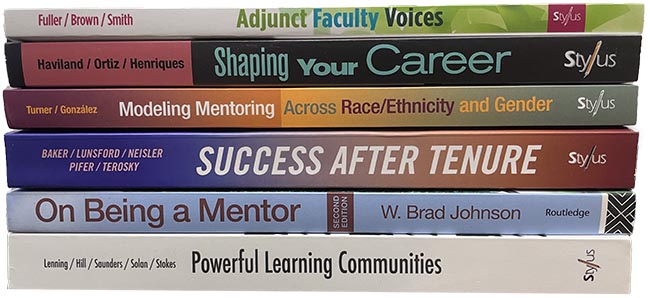| |
CETL | Canvas | AI Guide | Course Design | Online | Software | Workshops
 Mentoring Mentoring
Mentoring Matters
Tenure-track faculty members are clear about what they want: tenure and a life. It really is that simple. They want to be the extraordinary researchers, exceptional teachers, and awesome colleagues who exceed the standards for tenure (whatever those may be) AND they want to have a life beyond campus. These two things together -- explosive productivity and personal health -- are what it means to truly thrive in academe.
--A Mentoring Manifesto
Hey, what about us?!
--Every NTT faculty member, ever.
The only thing worse than no mentoring is bad mentoring.
--Me (Brian Smentkowski)
An institution’s reputation rests in no small part on the shoulders of its faculty. For a university to thrive, so too must its faculty, and this is where mentoring comes in.
Meaningful mentoring engages, leverages, and enriches the experience of all faculty. Further, research indicates that effective mentoring of junior faculty results in a stronger commitment to a career in higher education; a greater commitment to their institution; higher faculty retention rates; more effective teaching and service; more successful scholarship; heightened engagement in the department, and institution; higher rates of success in tenure and promotion; and higher rates of job and career satisfaction. (On Being a Mentor, p. 141). Moreover, mentoring is not just for tenure-track faculty: it is vital to the continued success and identity of mid-career faculty, fully promoted faculty, clinical faculty, and instructors. As we grow, we do not outgrow our need for mentoring and the opportunity to question and explore new areas of our fields, our profession, and our place in them. And critically, every member of the academic community is deserving of every opportunity to thrive, contribute, and develop a sense of belonging in their work and on campus. In short, mentoring matters, and to that end, CETL sponsors and supports a number of programs and services designed to advance:
- The Quest for Tenure and Promotion
- Success After Tenure
- Senior Faculty Engagement
- Adjunct, Clinical, and Instructor Success
- Well-being
- Mentoring Across Differences
Meaningful mentoring doesn’t just happen; it has to be developed and nurtured with intentionality and care. This is where CETL comes in. With 25 years of experience designing, developing, and leading faculty development centers and mentoring programs, Brian has the resources, materials, and experience to help individuals, departments, and institutions transform mentoring practices in ways that positively affect all parties involved. In collaboration with the Vice Provost for Faculty, the Center will be developing initiatives and trainings to advance a culture of meaningful mentoring for faculty of all ranks and position types.

Mentoring at the intersection of diversity, equity, inclusion, and accessibility
While it ideal for faculty to have a “go-to” mentor who is relatable and reliable along multiple dimensions, it is increasingly common and beneficial for faculty to have multiple mentors. These relationships are sometimes referred to “mentoring constellations” and are defined by mentors who provide support in specific areas. For example, a faculty member may have an outstanding mentor for research but may also desire a teaching mentor. While balancing these roles and ascending in rank, said faculty member may also desire a mentor who can provide emotional support, another who knows policies and procedures inside-out and backwards, and still others who can relate to identity issues, broadly defined. And while it is important for chairpersons to reach out to newer faculty, it is equally important for faculty to think clearly about their mentoring needs. The National Center for Faculty Development and Diversity has created a “Mentoring Map" (pdf) to help faculty do just that. This easy-to-use template will help you identify the areas where you may need or desire different kinds of mentors and mentoring, and is, of course, adaptable to your own personal and professional identity and aspirations.
The UI Mentor-Match Program
In furtherance of faculty success in all aspects of their careers and at all career stages, we have developed the UI Mentor-Match Program; a unique program that identifies potential mentors and mentees and facilitates the creation of successful mentoring relationships within and across academic disciplines.
The UI Mentor-Match Program is intentionally transdisciplinary. Instead of focusing exclusively on junior-senior faculty pairings within departments, it brings people together according to scholarly, pedagogical, career, and identity-sensitive interests, aspirations, and accomplishments. These relationships address the specific needs and interests of the faculty while providing a safe place for experiences, ideas, and opportunities to be discussed freely.
Resources
CETL has numerous resources on-hand to enrich your mentoring knowledge and practice. Here we share a few just-in-time solutions:
QUICK READS AND GUIDES
- Inclusive Mentoring by CETL (pdf)
- Mentoring Across Difference: A Toolkit by CETL (pdf)
- Beyond The Binary: Applied Strategies to Strengthen Mentoring Relationships, Enhance Inclusion, and Foster Community, Spring 2019 (pdf)
- Dr. Halverson’s presentation on Developing a Plan: Targets, Goals, and Action Plans, Oct 2018 (pdf)
- That New Hire Needs Your Help, The Chronicle of Higher Education, Aug 12, 2018
- Mentoring Map by the National Center for Faculty Development & Diversity (NCFDD), 2017 (pdf)
- My Writing Productivity Pipeline, June, 2016 (pdf)
- Finding a Mentor by Sorcinelli and Yun, April 2009 (pdf)
- When Mentoring is the Medium: Lessons Learned from a Faculty Development Initiative by Sorcinelli and Yun, 2009 (pdf)
- From Mentoring to Mentoring Networks: Mentoring in the New Academy by Sorcinelli and Yun, Dec 2007 (pdf)
- Mentoring for teaching and learning: a guide
- A quick scan of best practices (pdf)
- For a staff-inclusive POV (pdf)
- Peer Coaching: Professional Development for Experienced Faculty. Innovative Higher Education 33 (1): 5–20
BOOKS
- Baker, Vicki, ed. 2019. Success After Tenure: Supporting Mid-Career Faculty. Stylus Publishing.
- Felten, Peter, H-Dirksen L. Bauman, Aaron Kheriaty, and Edward Taylor. 2013. Transformative Conversations : A Guide to Mentoring Communities among Colleagues in Higher Education. San Francisco, CA: Wiley.
- Fuller, Roy et al, eds. 2017. Adjunct Faculty Voices: Cultivating Professional Development and Community on the Front Lines of Higher Education. Stylus Publishing.
- Johnson, Brad W. 2016. On Being a Mentor: A Guide for Higher Education Faculty. Second Edition. Rutledge Press.
- Lobban‐Viravong, Heather, and Mark Schneider. 2018. A Minimalist Model of New Faculty Mentoring: Why Asking for Less Gives More. To Improve the Academy 37 (2): 228–42.
- See also the companion piece: The Mentee’s Guide.
- Phillips, Susan L, and Susan T. Dennison. 2015. Faculty Mentoring: A Practical Manual for Mentors, Mentees, Administrators, and Faculty Developers. Sterling, VA: Stylus.
- Robison, Susan, and Christine R. Gray. 2017. Agents of Transformational Change: Coaching Skills for Academic Leaders. Journal on Excellence in College Teaching 28 (4): 5–28.
- Smith, Emily R., Patricia E. Calderwood, Faith A. Dohm, and Paula Gill Lopez. 2013. Reconceptualizing Faculty Mentoring within a Community of Practice Model. Mentoring & Tutoring: Partnership in Learning 21 (2): 175–94.
- Sotello Viernes Turner, Caroline and Juan Carlos Gonzales. 2015. Modeling Mentoring Across Race/Ethnicity and Gender. Stylus Publishing.
- Zachary, Lois J. 2011. The Mentor’s Guide: Facilitating Effective Learning Relationship. San Francisco: Jossey-Bass Publishers.
And more –just drop me a line.
Did I miss something? Add to the list!
--Brian Smentkowski (bsmentkowski@uidaho.edu)
|